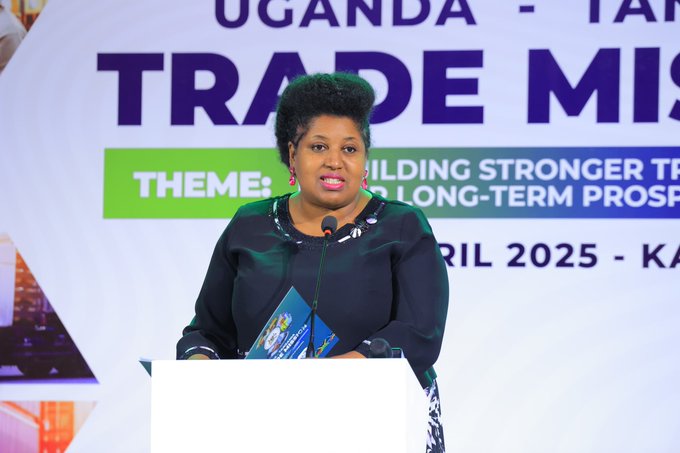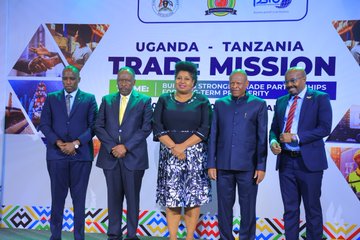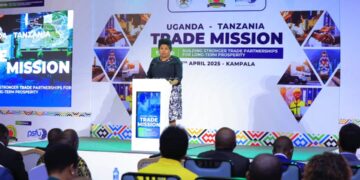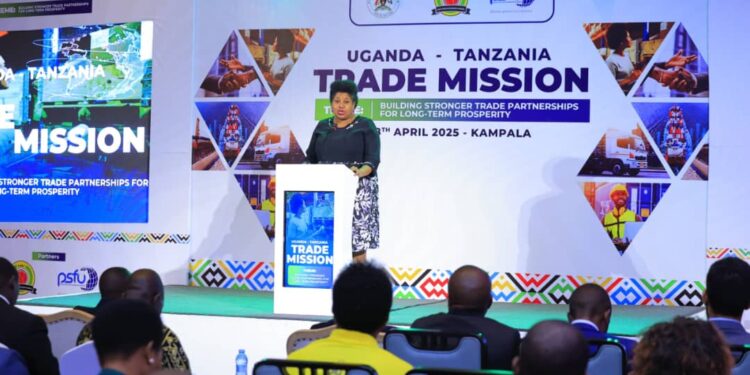The Uganda-Tanzania Trade Mission kicked off Tuesday at the Four Points by Sheraton in Kampala with a resounding call for stronger economic ties, deeper business partnerships, and enhanced private sector-led integration between the two East African nations.
The mission brought together senior government officials, private sector leaders, investors, and diplomats from both countries in a bid to deepen bilateral trade, foster business-to-business (B2B) partnerships, and harness the economic potential of the region.
Speaking at the event, Sarah Kagingo, Vice Chairperson of the PSFU Board of Directors, emphasized the significance of regional collaboration. “This trade mission is a pivotal opportunity to strengthen trade and investment linkages, building on our shared history and recent bilateral engagements,” she said.

Kagingo noted PSFU’s commitment to policy advocacy and enhancing Uganda’s market competitiveness at the national, regional, and global levels. PSFU, Uganda’s apex private sector body, represents over 3.5 million businesses through 341 associations across 13 economic sectors.
She praised the Uganda High Commission in Tanzania for curating the mission in collaboration with key partners, aiming to showcase investment prospects in Uganda across priority sectors, including agro-processing, construction materials, steel, dairy, pharmaceuticals, and fast-moving consumer goods (FMCG).
Unlocking the investment potential
The trade mission builds on earlier bilateral engagements, including President Samia Suluhu Hassan’s landmark visit to Uganda in May 2022. That visit resulted in major gains for Uganda’s trade interests, such as the reduction of road user charges, the lifting of restrictions on Ugandan agricultural exports, and Tanzania’s commitment to sourcing dairy, poultry, and electricity poles from Uganda.

“Key outcomes included reducing road charges from $500 to $10 per Kilometre, enhancing trade efficiency, increasing sugar supply by 10,000 tons from Uganda to Tanzania, establishing a branch of the Tanzania Ports Authority in Uganda to improve port services, commitment to buy Uganda’s electricity poles, poultry, and dairy products and removing restrictions on Ugandan eggs, maize, and dairy products, fostering market access,” she noted.
Last year’s reciprocal trade mission to Dar es Salaam underscored the value of such exchange visits. “These developments have set the stage for deeper economic ties, and this 2025 trade mission seeks to operationalize them through direct business interactions,” Kagingo said.
Recent trade figures underscore the growing economic interdependence between the two nations. Uganda’s imports from Tanzania surged to $1.35 billion in 2023, a 285% increase from 2022, while exports to Tanzania stood at $108.86 million in 2021, highlighting untapped potential.

Kagingo identified key growth sectors for bilateral trade: agro-processing: Uganda’s agriculture sector, which employs 68% of the population, has room to expand into value-added exports for the Tanzanian market; dairy: Following a 2022 agreement, Uganda’s dairy exports to Tanzania rose by an estimated 15% in 2024; steel and construction: With both countries experiencing rapid urbanization, trade in steel and construction materials offers mutual benefits and FMCG: Uganda’s fast-growing consumer brands are eyeing Tanzania’s 62 million-strong market, boosted by reduced trade barriers.
EACOP – a game changer
The East African Crude Oil Pipeline (EACOP)—a $5 billion project linking Uganda’s oil fields in Hoima to the Tanzanian port of Tanga—was also highlighted as a transformative infrastructure investment. Beyond oil, EACOP promises increased internet connectivity through an integrated fibre-optic cable and expanded local business opportunities in logistics, hospitality, and manufacturing.
“At the heart of this collaboration is the East African Crude Oil Pipeline (EACOP)—a monumental endeavour that symbolizes the spirit of regional integration. This 1,443-kilometer pipeline, stretching from Kabaale in Hoima, Uganda, to the port of Tanga in Tanzania, is more than just a conduit for oil; it is a lifeline for economic progress. With the investment of US$ 5 billion, EACOP is the largest single investment in both our countries, poised to unlock Uganda’s estimated 1.7 billion barrels of recoverable oil and connect it to global markets through Tanzania’s strategic coastal gateway.”

She added, “For the private sector, EACOP is a game-changer. It opens doors for local content development, with Ugandan and Tanzanian businesses supplying goods and services ranging from steel pipes to transportation and hospitality.”
Kagingo revealed PSFU’s strategic interventions aimed at maximizing benefits from regional integration: enhanced B2B matchmaking to spur investments and technology transfers, business development services to improve market access and financing for companies and continued policy advocacy to reduce non-tariff barriers and harmonize standards under East African Community (EAC) frameworks.
The event was graced by Gen. Wilson Mbasu Mbadi, Uganda’s Minister of State for Trade, along with representatives from the East African Business Council (EABC), Tanzanian and Ugandan private sector players, and the diplomatic corps.










